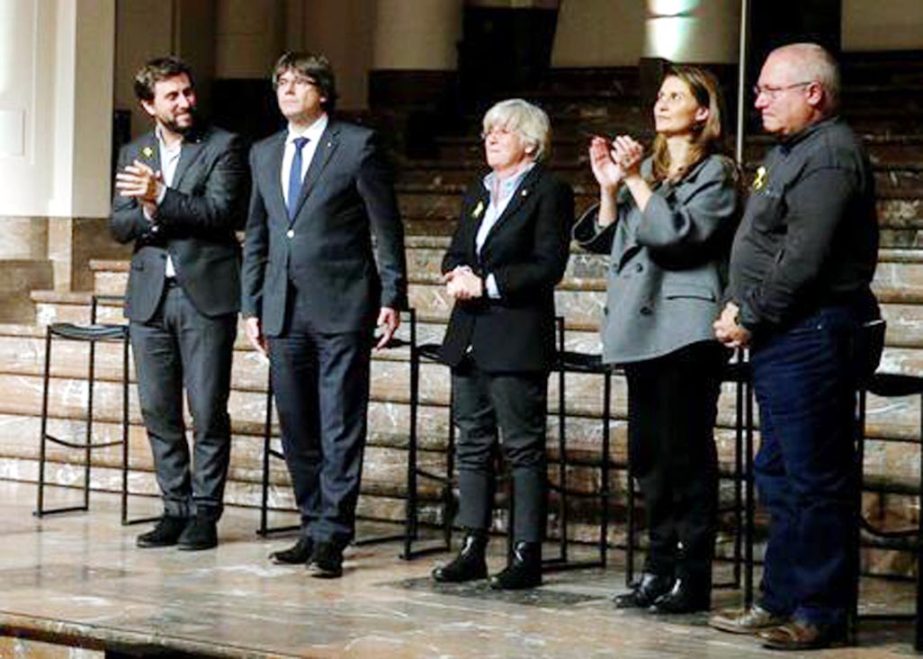
Reuters, Madrid ;
Catalan secessionist parties on Tuesday failed to agree on a united ticket to contest a December snap regional election, making it more difficult to rule the region after the vote and press ahead with their collective bid to split from Spain.
Catalonia’s secessionist push has plunged Spain into its worst political crisis in four decades, triggered a business exodus, forced Madrid to cut its economic forecast and reopened old wounds from Spain’s civil war in the 1930s.
Pro-independence groups have called for a general strike in the restive region on Wednesday.
Catalan political parties had until midnight on Tuesday to register coalitions ahead of the Dec. 21 vote, but the two main forces which formed an alliance to rule the region for the last two years did not manage to agree on a new pact in time.
While they could still find an agreement after the vote, political analysts say the lack of a deal on a joint campaign may also trigger a leadership fight at the top of the movement.
This is because center-right PdeCat (Catalan Democratic Party) of sacked Catalan president Carles Puigdemont is expected to be overtaken by leftist Esquerra Republicana de Catalunya (ERC) of former regional vice president Oriol Junqueras.
Puigdemont and Junqueras are the two main leaders behind the current secession bid that last month led to a unilateral declaration of independence which Spain thwarted by imposing direct rule on the region.
Junqueras is currently in custody pending a potential trial on charges of sedition, rebellion and misuse of public funds. Puigdemont, who faces the same charges, is currently in self-imposed exile in Belgium and has said he would oppose extradition.
An opinion poll released on Sunday by Barcelona-based newspaper La Vanguardia showed Junqueras’ ERC could garner between 45 and 46 seats in the 135-strong regional assembly while Puigdemont’s PdeCat would win between 14 and 15 seats.
In order to reach the 68-seat threshold for a majority, they would then have to form a parliamentary alliance with anti-capitalist CUP, which is expected to get seven or eight seats.
Catalan secessionist parties on Tuesday failed to agree on a united ticket to contest a December snap regional election, making it more difficult to rule the region after the vote and press ahead with their collective bid to split from Spain.
Catalonia’s secessionist push has plunged Spain into its worst political crisis in four decades, triggered a business exodus, forced Madrid to cut its economic forecast and reopened old wounds from Spain’s civil war in the 1930s.
Pro-independence groups have called for a general strike in the restive region on Wednesday.
Catalan political parties had until midnight on Tuesday to register coalitions ahead of the Dec. 21 vote, but the two main forces which formed an alliance to rule the region for the last two years did not manage to agree on a new pact in time.
While they could still find an agreement after the vote, political analysts say the lack of a deal on a joint campaign may also trigger a leadership fight at the top of the movement.
This is because center-right PdeCat (Catalan Democratic Party) of sacked Catalan president Carles Puigdemont is expected to be overtaken by leftist Esquerra Republicana de Catalunya (ERC) of former regional vice president Oriol Junqueras.
Puigdemont and Junqueras are the two main leaders behind the current secession bid that last month led to a unilateral declaration of independence which Spain thwarted by imposing direct rule on the region.
Junqueras is currently in custody pending a potential trial on charges of sedition, rebellion and misuse of public funds. Puigdemont, who faces the same charges, is currently in self-imposed exile in Belgium and has said he would oppose extradition.
An opinion poll released on Sunday by Barcelona-based newspaper La Vanguardia showed Junqueras’ ERC could garner between 45 and 46 seats in the 135-strong regional assembly while Puigdemont’s PdeCat would win between 14 and 15 seats.
In order to reach the 68-seat threshold for a majority, they would then have to form a parliamentary alliance with anti-capitalist CUP, which is expected to get seven or eight seats.

